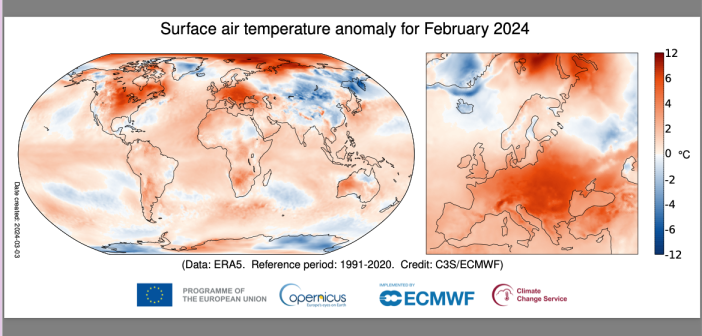Ocean temperatures are setting records all around the world, according to new reports, and the rising temperatures will probably lead to more storms ahead.
The average global sea surface temperature in February was the highest for any month ever measured, according to Copernicus, a climate arm of the European Union. February also set the record for any single month, 69.9 degrees Fahrenheit. The previous record was just in August, at 69.7 Fahrenheit. Copernicus measured the temperatures in all the oceans of the world between 60 degrees north and 60 degrees south.
The World Meteorological Organization reports that “Every month since June 2023 has set a new monthly temperature record, and 2023 was the warmest year on record.” Water temperatures in the North Atlantic have set records for more than a year. The WMO predicts that the above-normal temperatures in the global oceans will continue for at least the next three months.
“Ocean surface temperatures in the equatorial Pacific reflect El Niño,” said Celeste Saulo, secretary general of the WMO. “But sea surface temperatures in other parts of the globe have been persistently and unusually high for the past ten months. The January, 2024, sea-surface temperature was by far the highest on record for January. This is worrying and cannot be explained by El Niño alone.”
El Niño is associated with warming ocean-surface temperatures in the Pacific, but it influences the weather and storm patterns around the world, the WMO says. Warming oceans will lead to more unsettled weather, including more storms and stronger storms, it says.
New studies by the Climate Change Institute at the University of Maine say that ocean temperatures in the Atlantic, Pacific and Southern Oceans are all in new territory. In the past several months, the average temperature in the three oceans was running about 1.44 degrees Fahrenheit above normal, the institute says, while the temperature in the North Atlantic was 2 degrees Fahrenheit above average.
The effects of warmer oceans go way beyond the weather. Rising ocean temperatures have a profound effect on marine ecosystems and coral reefs.




